Nowadays, people regularly watch streaming programs on television or use the internet to watch their favorite movies and shows online on paid apps. You can find many apps that provide your favorite shows and movies such as Netflix, Hulu, HBO, and other streaming apps, and that are all paid apps.
If you want to experience a completely free streaming app with high-quality content and a large library of movies and tv shows, download Cinema HD APK from our website CinemaHDv2.Net to enjoy right now.
You will quickly find the content you love and enjoy on your Android device thanks to the attractive features that this app provides. Continue reading the article to explore these features.
Table of Contents
Introducing Cinema HD Apk
Cinema HD is a great app for your Android devices that gives you a list of popular movies, and high-quality TV shows. This app gives you a search engine for you to quickly find the movies and tv shows that you love and choose to enjoy.

Cinema HD Beta Version
This app will display the links that are available for free on the website, and they will show up on your device. With this app’s compelling features, you’ll never run out of streaming options for your favorite shows and movies. What does Cinema HD Apk have?
Outstanding features of Cinema HD
Simple user interface
This Cinema HD app has a simple interface that helps you quickly understand how to use it and the function buttons on the application screen. You can easily browse through the titles that Cinema HD arranges in this app.

Cinema HD app
It also allows you to look through trailers of movies and shows before you decide whether to choose which content to enjoy or not. The good and simple interface of this Cinema app will help you to have a great movie-watching experience.
Tons of movies and TV shows
This Cinema application offers you a treasure trove of movies and shows in 60 categories. You can easily find a variety of movies from horror, romance, anime, and more in the category of this app. Besides a huge library of movies, you will also easily find TV shows and enjoy them completely free with Cinema HD.

Cinema HD v2
Miniature cinema experience
Cinema HD gives you a great movie viewing experience like watching in a miniature cinema. If you are afraid to go to the cinema to watch movies, this app will be a suitable choice for you.

Cinema HD v2 – Miniature cinema experience
You just need to open your Android phone and access this Cinema Apk to enjoy your favorite content right in your home or wherever you want. This app will help movie and entertainment enthusiasts like you save a lot of time and enjoy your favorite content more easily.
Enjoy content with subtitles
This Cinema HD app will give you a useful feature in that you can play videos with subtitles by default. If you do not select subtitles, you will have to manually select the file to enjoy the contents. The application will provide subtitles correctly to give you the most perfect movie-viewing experience.
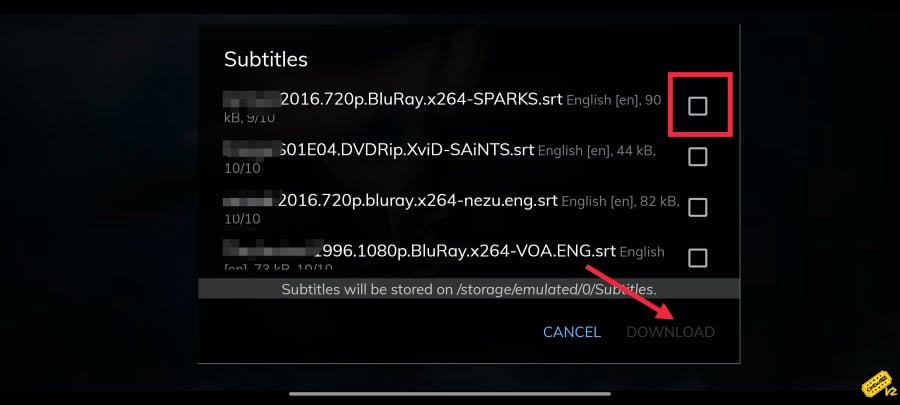
Enjoy content with subtiles – Cinema HD v2
Add your favorite shows to your list
In Cinema HD, you’ll have a great selection with Trak TV integration that helps you create playlists for you to quickly play your favorite shows. This feature will create a list of the shows you have watched recently and it will notify you every time there is a new episode of the show or movie you have watched.
As a result, you can quickly and easily update new content and enjoy the many attractive features the app has to offer.
Autoplay
With Cinema HD, you will have the option to turn on autoplay to quickly enjoy the movies and shows of your choice. When you select something, it will display some links, and you will need to select one of those links and select the “Play” option to start viewing. But with autoplay, you won’t have to choose links, and the Cinema HD app will start playing the video for you.
The Suggested List feature
Cinema HD has another useful feature which is the Suggested List, a strong point of this movie application loved by many users. So many new shows and movies are searched for and updated on the main menu of the application daily.
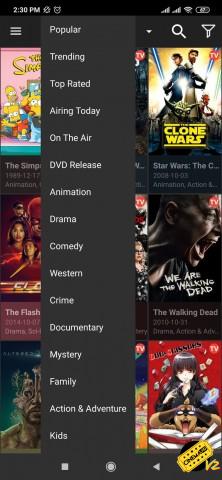
Cinema HD V2 – The Suggested List feature
In addition, the application also provides you with another list that relies only on the app’s AI filtering tool to filter and recommends movies and shows of the same genre as what you are watching or looking for.
The movies and shows that Cinema HD recommends for you will all come with detailed information such as name, rating, origin, release date, trailer, and main actors. From the detailed information that helps you to understand the information about the movies, the program makes it easy for you to choose the right content for you and enjoy it.
High quaility revolution and sound
To give you the best experience, besides providing a large number of shows and movie streams, Cinema HD also helps you enjoy high-quality content without logging into real debris.
You will have the perfect relaxing time with your favorite shows and movies in full high-quality resolution with this app. In addition, you can use the autoplay feature to watch HD or ultra HD movies in Cinema HD.
Enjoy movies and tv shows offline
You will have a more enjoyable movie-watching experience with the offline download feature that Cinema HD offers you. With this useful feature, you can easily download movies, and TV shows and enjoy any of your favorite content easily.

movies and tv shows – Cinema HD v2
You can enjoy movies, and shows on your Android mobile anytime and anywhere you want with this Cinema HD Apk app. Download movies, and TV shows and immerse yourself in TV episodes, and films without an internet connection or mobile data charges on your device.
Save and Restore
Cinema HD will save you a lot of time when using the app by backing up all of your likes, history, settings, and preferences to a separate file just for you. To find the location of this file, you will go to Download/cinema HD/backup.
You can also export the file and upload it to any of your new devices. Furthermore, this app provides you auto-backup feature, so you can enable it after exiting the app in the backup and restore settings. From there, the backup will be handled after you close the app, and you can easily continue to enjoy your favorite content next time.

Download Cinema Hd v2 apk
The Cinema HD app will also provide you with many other basic features such as filters, a default video player, and the ability to filter out low-quality content. You will find these diverse, useful features to give you a wonderful viewing experience of your favorite movies and shows.
What is special in Cinema HD Apk file
If you want to experience an enhanced version with many advanced features free for an even more awesome experience, download Cinema HD Apk on our website CinemaHDv2.Net. With our Cinema HD Mod Apk, you will get many advanced features, including All content is free and unlimited.
Unlimited number of movies and shows for free
Cinema HD Apk is a modified version of Cinema HD TV shows that is available for free on our website CinemaHDv2.Net. With this apk file, you can freely access all the content that the Cinema HD app provides for free.

Cinema HD – Watch HD movies free
In addition, the Cinema HD Apk will also provide you with an unlimited amount of content, so you can enjoy your favorite movies and shows without worrying about running out of content.
Thanks to these advanced features of this movie app, you will save a lot of money and don’t need to pay monthly subscription costs, just select your favorite content and enjoy.
No registration required
If you have ever experienced movie viewing platforms like Netflix, HBO, or some other streaming apps, you will probably be tired of having to sign up for an account and pay fees to access your favorite movies, shows, and rewards. wake them up.
Now, you won’t have to worry about this anymore, Cinema HD application will provide a tool to freely choose and stream movies, and TV shows without having to sign up for an account and completely free.
You do not need to worry about disclosing your personal information to register an account such as your name, address, and email. With this feature, you can freely access and entertain with your favorite content that Cinema offers without having to log in to your account.
No ads
In Cinema HD Apk, you will not have to worry about ads appearing to interrupt your experience. This mod version of Cinema HD will remove all ads so you can stream movies, and TV shows seamlessly and without interruption.
How to download Cinema HD Apk on Android?
General steps to download the Cinema HD App

Cinema hd v2 apk download
To download the Cinema HD Apk application to enjoy free movies, and TV shows, you can follow the simple steps below:
Step 1: To install Cinema Apk, you will need to allow your Android device to install this app from external sources. To enable this setting, you will need to go to Settings in your Android, then select Security, and then enable unknown sources.
Step 2: On your Android device screen, you will go to CinemaHDv2.Net and then search Cinema HD Apk on the search bar.
Step 3: Click the “Download Cinema HD v2 APK” button in the lower part of the article
Step 4: Wait for the Cinema HD apk app download process for a few seconds, then you can open this cinema apk to enjoy.
Detailed instructions to install Cinema HD Apk
Firstly, you will go to settings on your Android device, and select “Apps and notifications“:

Next, select “App Permissions”

Then, you will go to “Install unknown apps”

Choose Chrome browser for options:

Turn on: “Allow from this source”

At the home screen, you will go to Chrome browser and then choose downloads

Perform the process of Install Cinema Apk File

Install Cinema HD v2
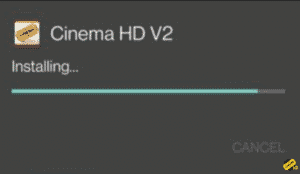
Wait for the installation to complete
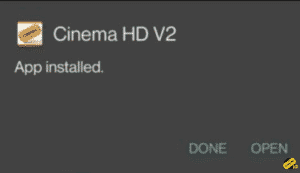
Open Cinema Hd v2
After completing the installation process of Cinema HD V2, now you can quickly open the app file and enjoy many movies and TV shows that Cinema Apk provides on your Android smartphones, without an Android emulator.
How to download Cinema HD App on FireStick 4K, Fire TV?
To download this Cinema HD Apk on FireStick 4K, Fire TV Stick 4K, if you have installed any apk file on your Fire Stick, it will be easier to install the app. Otherwise, you will need to follow the steps below to install Cinema Apk on Firestick:
Step 1: First, you will start your device and wait for the home screen of the device to show up. On your control system screen, you will need to enable “Unknown sources” (Install unknown apps) to change.

Step 2: Next, choose: “My Fire TV” or “My devices”

Step 3: Then, you will click on: “Developer options”

Step 4: The screen will show the option “Unknown resources” that you can enable or disable.

Step 5: Next, you will search for the option “Downloader” on the Home Screen and click on “Allow” to use this app to open the downloader app.
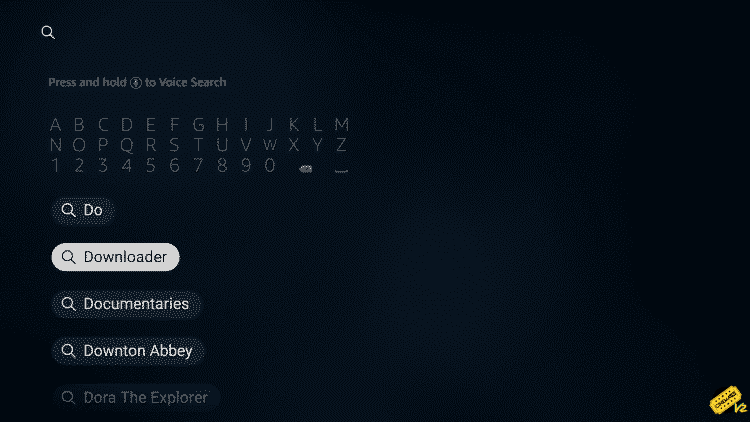
Search Downloader

install Downloader
Step 6: In the “Downloader app” screen on your Fire TV Stick, you will do to its browser section and enter the link: https://cinemahdv2.io/download-cinema-hd/ to open the Cinema Apk app and download this free space file app to enjoy movies and programs. Or download the apk file here:
⬇︎ Download Cinema HD V2.4.0 APK

Step 7: After completing downloading the Cinema Apk on Firestick, and Fire TV, it will then set up the installation automatically and quickly. You should not: do not exit the main screen for the installation process to take place successfully.

Step 8: After completing installing Cinema Apk on Firestick, you can open the Cinema HD Apk file and enjoy your favorite shows and movies anytime, anywhere you want.
You can quickly install Cinema HD apk on FireStick 4K, Fire TV Stick, and Fire TV Cube with safe and efficient steps for your media access. You can freely enjoy streaming content when using Cinema HD apk without going to Streaming Sites or having to install apps.
Steps to install Cinema HD Apk for PC?
Download and install the Cinema HD APK on a Windows 11/10/8.1/7 PC or MAC computer [TUTORIAL]
You’ll need an Android Emulator for this. Nox App Player is a great new Android emulator with a lot of useful features. You may get the Nox App Player offline setup from below.
For Windows:
⬇︎ Download NoxApp Player For Windows
For MAC:
⬇︎ Download NoxApp Player For Mac
- Wait for the installation to finish. When the offline setup has finished downloading, double-click the executable file to begin the installation process for Nox App Player.
- When you will start Nox App Player, an installation wizard appears on the screen with a few buttons. On the final window, an ‘Install‘ button will be visible. Please tap the ‘Install‘ button to let the setup install Nox App Player on your Windows PC/MAC Computer.
- After launching the emulator, keep in mind that it may take some time for it to install. The Nox App Player will quickly be set up on your PC.
- Then, if you haven’t already, download the Cinema APK from the link below.
- When the APK files have finished downloading, double-click on them to launch Nox App Player. Select Open With from the pop-up menu that appears.

- The emulator will automatically download and install the APK file on your Windows PC/MAC Computer.
- The procedure will take just a few minutes to complete. After that, the Cinema APK icon can be found on the Nox App Player home screen.
- To launch the program, simply tap its icon.

On Linux Mint, Ubuntu, and Fedora, install the Cinema HD MOD APK.
You may install Android APPS on Linux and its derivatives, including Mint, Ubuntu, and Fedora, using the Shashlik Android Emulator or GenyMotion Android Emulator.
Steps to Install Shlashlik Android Emulator on Linux
You may view the developer’s instructions for the Shashlik Android Emulator from here. We’ve also included a copy below for your convenience.
- Using the following command in a command prompt, download the Repo Tool:
$ mkdir ~/bin
$ PATH=~/bin:$PATH
- Next, type the following command into the command window on the next screen that appears:
$ curl https://storage.googleapis.com/git-repo-downloads/repo > ~/bin/repo
$ chmod a+x ~/bin/repo
- Now, please create a new directory and begin repository sync. For your convenience, the following commands have been provided.
mkdir shashlik
cd shashlik
repo init -u https://github.com/shashlik/shashlik-manifest
repo sync
- Finally, type the following command to complete the installation.
source build/envsetup.sh
make
How to Get the GenyMotion Android Emulator on Linux
- You may use the link listed above to download GenyMotion Android Emulator on your Linux machine.
- Finally, download and install GenyMotion on your Linux PC. You can get more information on this process from the link above.
Install the Cinema HD app on a Linux computer using Shashlik/GenyMotion Android Emulator
Make Use of the Shashlik Android Emulator
- Download and install the Android emulator from http://www.shashlik.com/ -> On your Linux PC, download and launch the Shash.

- Download the Cinema HD Latest APK file to your device. We’ve provided a link to it below, as a convenience for you.
Drag and drop the Cinema HD MOD APK file onto the Shashlik Emulator’s interface.
- The next step will be to run the installer.
- After installation, you may start using Cinema HD on your Linux system.

Using the Genymotion Android Emulator
- Please open the GenyMotion Android Emulator.

- Drag and drop the Cinema HD Ad-Free MOD APK file that you downloaded from the previous page in to GenyMotion’s interface.
- The installation will now begin.
- After the installation is completed, you may use Cinema HD APK to stream your favorite movies and TV shows for free.

How to get Cinema HD to work on Android TV Box & Smart Tv?
Now you can watch your favorite films and series on your Android device. With Cinema APK, you may enjoy all of your favorite movies, TV shows, and series for free. You may now binge-watch as much as you want thanks to this amazing software, which comes with excellent capabilities and is totally free.
Cinema HD APK has a large number of TV channels to give you in high-definition, and because this app is so wonderful that it’s likely to keep you glued to your Android device for all time.
Features Cinema HD on Smart TV
Although the application is not yet available on Google Play, it may be installed on your device using third-party resources. The app is completely free and contains a lot of material for you to enjoy.
The app includes several outstanding characteristics and features, some of which are as follows.
- There are no hidden costs associated with this service.
- The application’s high quality of content adds to its appeal.
- The program is extremely secure and trustworthy.
- It has a great appearance that makes it seem much more attractive.
- There are a wealth of TV stations and other material accessible, which is fantastic.
Install Cinema HD V2 on Smart TV [LG, VU, OnePlus, Samsung, MI, Phillips]
Method 1: Using Pen Drive Method
1; You may use this software on your Smart TVs, such as Samsung Smart TV, LG Smart TV, Sony, and others.
2; First and foremost, turn on your Smart TV’s Settings menu.
3; Set Allow from Unknown sources to On.

4; Find “ES File Explorer” in the Play Store and download it to your device.
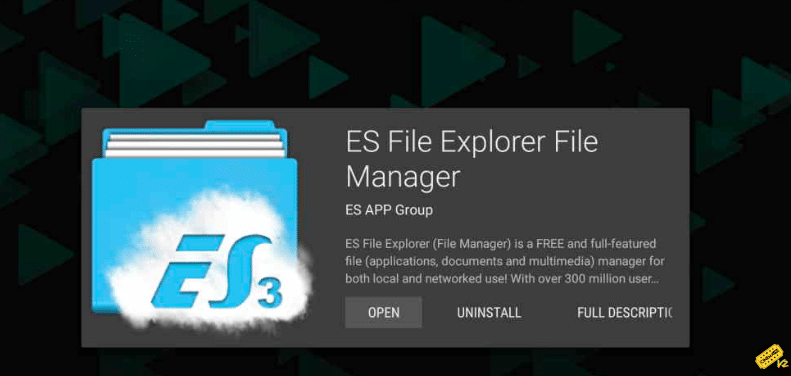
5; Open the app and tap ADD.

6; After that, double-click the file and have it installed on your Android device by clicking on the bookmark. -> Click on the bookmarks to access and install a Cinema APK app from https://cinemahdv2.io/.
7; You can install the program from downloaded files and then start using it.
Method 2: Using Puffin Browser
You may install the Cinema HD APK file on your Smart TV using Puffin Browser. The Puffin browser is a new browser that is primarily used on Smart TVs to download apps. Let me walk you through how to download and install Cinema HD APK with the Puffin browser.
- Open the Smart TV’s Play Store and install the Puffin Browser.
- On your Smart TV, open the Play Store and install the Puffin Browser.
- Open the Puffin Web browser on your Smart TV (requires a connection to the Internet).

- Download the Cinema HD APK from the link below using the Puffin browser. The APK file will be saved in your Downloads folder after downloading.
- Tap on the APK file once you’ve downloaded it to your computer. Then, go to the downloads folder and double-click the APK file. The Unknown Sources option will be activated.
- If you want to install an APK file on your smart TV, you must first turn on the Unknown Sources option.
- After enabling the Unknown Sources option, use the remote’s Enter button to open the downloaded APK file.
- The Cinema HD APK will be installed on your Smart TV after you tap on the install button at the prompt.
- The Cinema HD app has now been installed; you may access it by going to Apps on your Smart TV.
Before downloading and installing the Cinema HD APK, be sure that your smart TV has enough room.
How to Use Trakt TV on Cinema HD v2 on a Smart TV
Trakt TV is a smart TV add-on that records all of your watch histories. The Trakt TV add-on will keep track of everything you view on your smart TV. You may look back at previous shows you’ve seen on your smart TV. Here are the procedures for including the Trakt TV add-on in the Cinema HD app.
- After you’ve installed the Cinema HD app, go to the menu option and select Settings.

- Tap the Accounts option in the Settings menu.

- In the accounts menu, pick Login to Trakt TV as the third option. Install the add-on by selecting the option.
- Now you’ll need to enter your Trakt TV credentials in the login box. In the username and password fields, type your username and password. Then press the “Sign In” button.

- The Trakt add-on now lets you keep track of every watch episode.
Download Cinema HD V2 APK For Android TV Box
Follow the same procedures as previously, but this time go to your Android TV Box‘s security settings and enable Unknown Sources.

- Right after that, you may use the supplied link to obtain the app’s APK file.
- Wait till the download is finished and open the file.
- Look for the app in your Android TV Box after installation is complete.
- You may now launch and use the program from this screen.

Install Cinema HD V2 APK on Roku Stick
Before you start the installation, make sure that your Android smartphone and Roku device are connected to the same WiFi network. You don’t need to root your Android phone for this.
You can download the Cinema APK File to your Android smartphone from here.
Download the CINEMA HD v2 APK from the link below:
Step 1: On your Android device, download and install the Local Cast app.
- To begin, you must download and install a third-party program known as ‘Local Cast‘ from the Google Play Store.
- Open the Local Cast app. The main screen of the application will have a yellow Casting Icon. Select one by tapping on it, and you’ll be taken to a list of devices that can be streamed.
- There will be a choice to change the active scan. Use this method to enable the ‘Discovery Options‘ on Roku.

Step 2: Download and install the Local Cast Receiver app on your Roku device.
- To begin, connect the Roku Stick to your Smart TV and ensure that you have a stable internet connection in your home.
- Open the Roku Store on your TV.
- In the bottom right corner, you will see a search option; this is where you may look for Local Cast Reciever.
- Once everything has been installed, return to the main page of your device’s menu.
Step 3: Connect Your Android or Apple Device and Roku Stick
- Install the latest cinema HD supplied in the preceding link and start it up.
- Now you must pick a film or TV show to watch.
- You will be given unique links to access the movie or program you’ve chosen.

- You must first Tap and hold any links that appear, then choose the Open with All Cast option.
- That’s all there is to it! Now your favorite film/TV series may be viewed on Roku. You will not be prevented from taking phone calls or sending messages while streaming on your Android smartphone.

To install Cinema HD APK on Roku, follow these five easy steps. If you have any questions, please do not hesitate to contact us through the contact page.
Install Cinema HD v2 for Google TV 4K on the Chromecast
Android fans will be glad to learn that the new Google TV 4K with Chromecast supports Android apps and games. This implies you can install third-party Android APKs on the latest Google TV 4K with Chromecast as well. Let’s look at how to install Cinema HD APK on Google TV 4K using Chromecast in this article.
To install Cinema HD Ad-Free APK on Google TV 4K, you must complete a series of actions. Here is a brief rundown for your convenience.
Enable Developer Options (Part 1)
Follow the steps below to connect your Google TV gadget with your smart TV.
- Tap on the Profile Menu button in the top-right corner of the Google TV screen.
- Settings, gear icon Tap on Select a System Scroll down and pick On Android TV OS Build 7 times using the Google TV remote’s center round button, please select About.
- Please tap on Android TV OS Build 7 times using the Google TV remote’s center round button under About.

- You’ll see a notification reading “You’re a Developer.” You will be able to download third-party applications on Google 4K.
Install the Cinema HD APK for Google TV 4K (Part 2)
- Please go to the Apps option from the horizontal menu on Google TV’s home screen.
- Then, under App Categories, choose Search for Apps.
- Install Downloader on your Google TV by entering Downloader in the Search Bar.

- Open the Downloader App once the installation is finished.
- Please open Privacy > Security & Restrictions in your Profile Settings.
- Please check Unknown Sources has been enabled under the option of Unknown Sources.

- After that, launch the Downloader app from the home screen under the Your Apps section.
- Allow access by tapping on Allow.
- Please input the following URL into the Downloader App’s URL field to download Cinema HD Latest APK for Google TV.
- When you’ve finished downloading the APK, simple on-screen installation instructions will appear. To install Cinema HD on Google TV, follow the same steps.

That’s all there is to it! You can install any third-party Android App on Google TV 4K with Chromecast by following the above instructions.
How to Update the Cinema App on Google TV with a Chromecast
The process of updating Cinema HD on Google TV to the most recent version is straightforward. We’ve outlined everything below for you.
- Go to Your Apps > Cinema HD.
- Select and hold the app listing.
- A screen will appear asking you to select View Details.

- Update or Uninstall are the two choices.

- Open the Google TV remote app on your Android system and go to Settings, then select Apps. Select Cinema HD MOD APK to remove it from your

Please keep in mind that you won’t receive automatic updates for the app since it isn’t from the Google Play Store. To obtain the most recent version, simply uninstall and reinstall the application.
How to update Cinema HD Apk with the Latest Version?
In order to bring you the experience of watching films, and TV shows in unlimited quantity, the content developers of Cinema HD Apk will continuously update and release new versions with additional features, fixed bug versions, and many more.
If you want to update to the latest version of the app, you can follow the simple steps below:
When you get an auto-update message every time a new version is available, you can click on Install in the update window and start installing the new version.

You can also check new updated versions of the app from Menu → Communicate → New Update Available and start updating the new version to enjoy.
How to use Cinema HD Apk?
After completing the installation of the Cinema Apk, you will find the application very simple to use because it does not require any technical knowledge. You can quickly open this app from the main screen to start enjoying streaming content.
When you open the Cinema Apk for the first time, you will see the app’s basic information. And you will tap “Continue” to continue using this app, or you can tap “Close” if you want to stop.

When you continue to use the Cinema Apk, you will be presented with the user interface, which will display the TV shows by the default video player. To choose to stream free movies, go to Menu and select Movies from the drop-down menu.
In the catalog of content, this Cinema Apk provides, you will find a collection of popular Hollywood movies and TV shows, and you can choose any favorite content to enjoy by selecting it from the home page or searching for it using the search box.

After choosing your favorite content, you will need to touch the “Watch” button and begin to immerse yourself in attractive shows and movies. You can also choose from over 20 different languages supported by Cinema APK. As a result, you can watch popular content from locations where you are unfamiliar with the local tongue.

If you are not satisfied with the default setting of this Cinema Apk, you can uninstall it and reinstall the app. You can use the Real Debrid link generator to prevent caching. Real Debrid will provide you with lots of high-quality links from servers that reduce caching and you can enjoy high-quality movie and show links. So quickly log into real debris in your account settings and get these links right away.
FAQs about Cinema HD V2
Conclusion
Cinema HD Apk is one of many Android apps that provide you with your favorite shows and movies. This app stands out in that it provides Android users with a known Cinema app and HD Movies with thousands of movies and TV series. You can satisfy your movie passion with this app, so quickly download the latest version on Android, Firestick & PC on our website to enjoy it right now.

